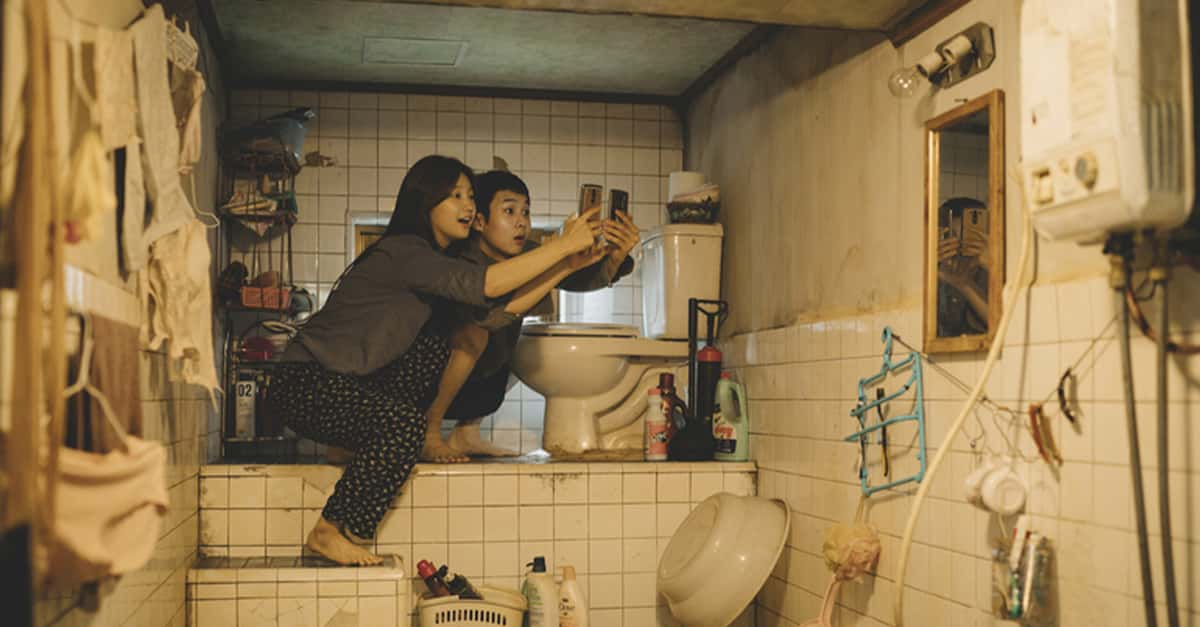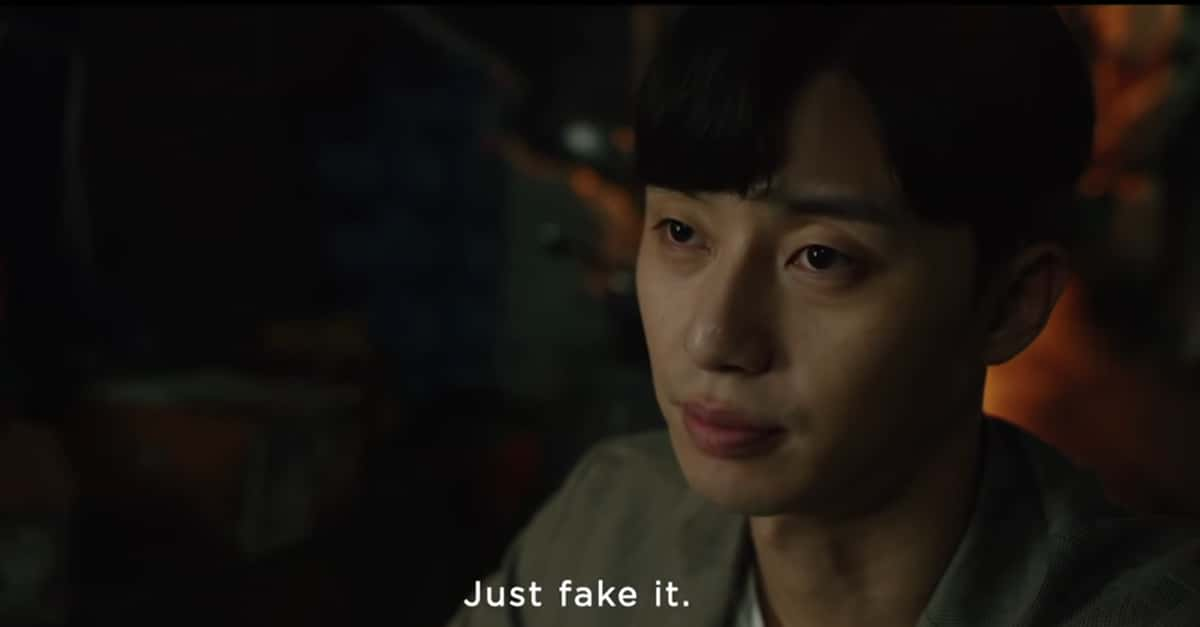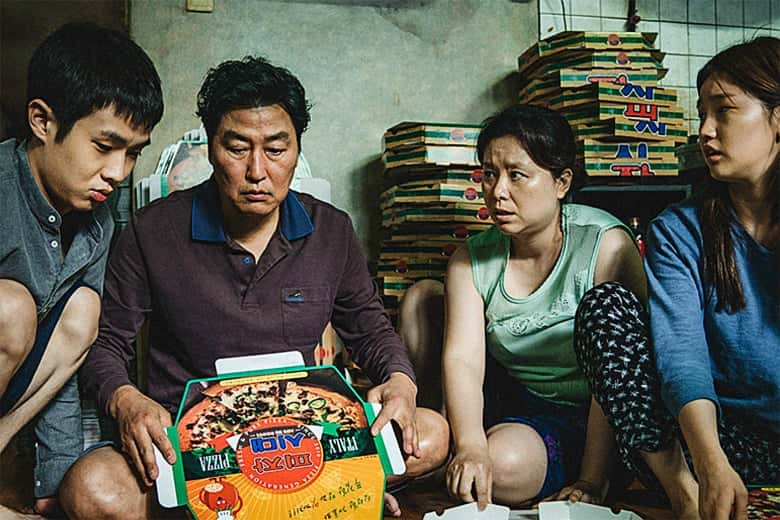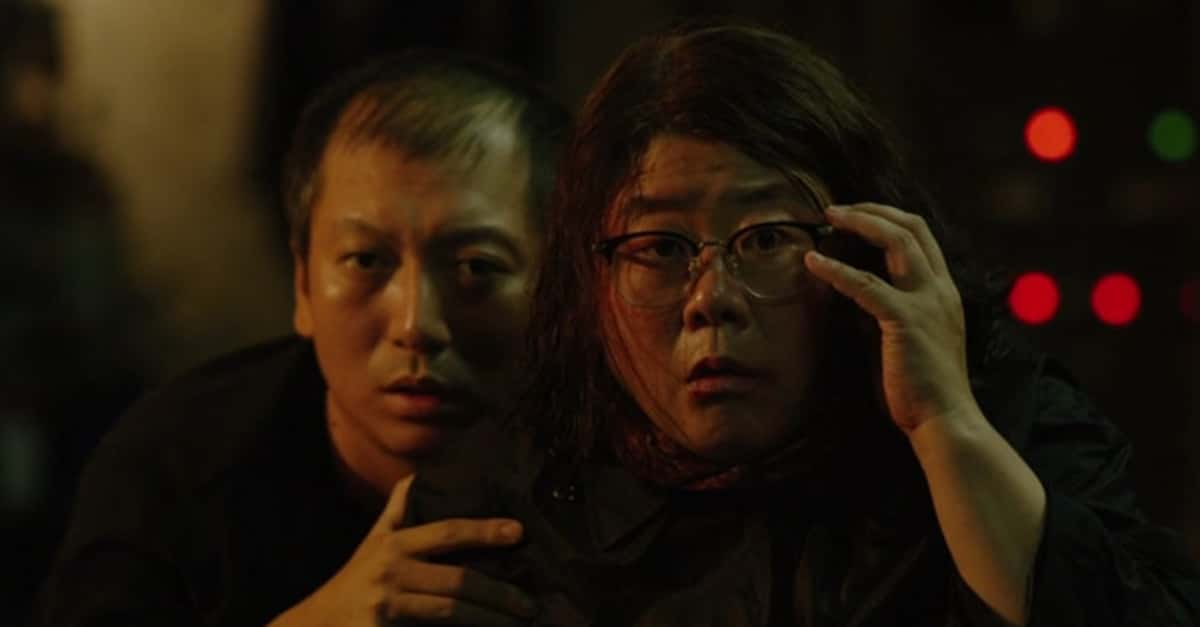Scammers and con artists are always around, but there’s something about unstable times that brings them out of the woodwork. We currently live in a new era of the con artist, featuring hustlers like the bankers behind the financial crisis, Billy McFarland and his bogus Fyre Festival, and viral internet personas like Joanne the Scammer.
Two recent films reflect this cultural “age of the scammer”—but they focus on people who we don't usually see as grifters. While Lorene Scafaria’s Hustlers features a diverse group of women, Bong Joon-ho’s Parasite centers on a poor Korean family. Both explore how income inequality and class divides lead people to find…let’s call them “alternative” forms of work. In the process, Hustlers and Parasite reveal the near-impossibility of working your way up the social ladder.
 Hustlers, STX Entertainment
Hustlers, STX Entertainment
Parasite and Hustlers Editorial
***Heavy spoiler alert for both Hustlers and Parasite.***
From the American Dream to the American Scam
Since the 2008 recession and the burst of the subprime mortgage bubble, the so-called “American dream” has become virtually unreachable. The effect of this crisis? In the last decade, scamming has shifted from a crime to an attractive venture. The fact that there seems to be few consequences for lying, cheating, and abusing trust only serves as encouragement for would-be grifters.
As Jia Tolentino puts it, the results of the 2016 US presidential election were an “incontrovertible, humiliating vindication of scamming as the quintessential American ethos.” When Trump ascended to power, people who spent the last decade struggling realized that honesty and hard work aren't enough anymore. Only liars win.
Everyday She's Hustlin
In Lorene Scafaria’s Hustlers, viewers meet the film's two main characters just before the 2008 financial crisis. Destiny (Constance Wu) and Ramona (Jennifer Lopez) work in a strip club frequented by Wall Street bankers and genuinely believe that they can still reach the American dream if they work hard enough. Despite the barriers that hold Destiny and Ramona back (like class, sex, and race), they truly think that they can achieve upward financial mobility.
The film opens with Destiny starting a new job at the strip club Moves. She struggles, and after seeing the success achieved by her colleague Ramona, Destiny gets Ramona to take her under her wing, thus ensuring her triumph at the club. Even though Destiny reads as the straight woman who gets swept up in a life of crime, the way she approaches Ramona could be read at the first scam of the film. Destiny acts shy and alienated, banking on Ramona’s motherly instincts to kick in.
 Hustlers, STX Entertainment
Hustlers, STX Entertainment
In the film's first act, the club's dancers rake in tips, celebrate good nights, go on shopping sprees, and even party with Usher. The good times roll, until Destiny gets pregnant and quits. Flash forward a year: When Destiny runs out of cash and can't find another job, she returns to Moves and is stunned to find that her old colleagues have left, and their once-affluent clientele are dwindling. The 2008 financial crisis has hit, and for Destiny and Ramona, any chance of maintaining their lifestyle, let alone paying the bills, is gone. Enter the scam.
 Hustlers, STX Entertainment
Hustlers, STX Entertainment
Sorry to This Man
Ramona, along with Mercedes and Annabelle (Keke Palmer and Lili Reinhart), meets men at bars, gets them drunk, and takes them to Moves. Once there, the girls run up the men’s credit cards, give the club’s manager a cut, and take the rest of the goods home. Ramona recruits Destiny and explains that most of the men that they con are too humiliated to report that they've been scammed by a lowly dancer.
At first, everything goes great. The women return to the lavish lifestyles they enjoyed before 2008—but, of course, the good times don't last. Ramona becomes hardened, hiring unreliable women, hitting up vulnerable men, and abandoning Destiny in a time of need. Finally, one of their victims comes forward, and despite his mistreatment by police, the women get busted. Ramona refuses to talk, expecting the same of Destiny—but Destiny takes a plea deal. She confesses that she betrayed Ramona outside of the police station, but instead of yelling at Destiny, Ramona understands that Destiny needs to be free so that she can raise her young daughter.
 Hustlers, STX Entertainment
Hustlers, STX Entertainment
Flip the Script
If Hustlers were like another movie, this would be the “Fredo, You broke my heart,” moment. But it’s not—instead of breaking out into violence or pursuing vengeance, the girls simply go their separate ways. The conclusion, set many years later, even makes a reunion seem hopeful. Hustlers isn't your standard gangster movie for one simple reason: It focuses on lower-class and/or racialized women, instead of the usual crop of white men.
While the movie never denies that greed and ambition drove the dancers to commit crimes, Hustlers also emphasizes that the scammers are victims too. Because of their shared circumstances (being women, being women of color, lacking money or any other means to change their financial situations), the dancers understand each other's challenges and motivations. At the end, Ramona sympathizes with Destiny and opts for forgiveness instead of violence. While it’s not a happy ending (Ramona works a thankless retail job; Destiny is lonely), it does push the gangster genre forward in crucial ways.
 Hustlers, STX Entertainment
Hustlers, STX Entertainment
Tale As Old As Time
I'd be remiss not to mention that Hustlers isn't some parable. It's based on real life. After reading a New York magazine story by Jessica Pressler, writer and director Lorene Scafaria adapted the tale into a screenplay. Ironically, the male-dominated film industry nearly took Scafarai's female-centric story and gave it to Martin Scorsese. Like the women in her film, Scafaria had played by the rules...and nearly had nothing to show for it. It was only when Scorcese passed on the project that Scafaria finally got her chance to direct the film.
 Getty Lorene Scafaria, the writer and director of Hustlers
Getty Lorene Scafaria, the writer and director of Hustlers
Bust to Boom
When the USA experienced the 2008 financial crash, the rest of the world went through recessions too, but in South Korea, things couldn’t have been more different. Before the Korean War, South Korea was a developing country with such rapid economic growth that economists called it the “Miracle of the Han River.” This miraculous streak continued throughout 2008, as South Korea's economy managed to boom when everyone else's finances bust.
 Parasite, CJ Entertainment The wealthy Park family's mansion
Parasite, CJ Entertainment The wealthy Park family's mansion
Even so, economists question South Korea's future. In light of the chaebol system, North Korean instability, and massive financial losses in 2019, South Korea's economy may not grow for long. Income inequality has risen since the 1990s and institutions that benefit the poor, like welfare and trade unions, are not common there.
Many elderly impoverished South Koreans only recently began to receive social security and, despite low unemployment rates, unemployment is on the rise for those under 30. Even when people manage to find work, they accept temporary contracts with low pay and no benefits. The poverty rate may be low, but income inequality is a huge issue.
 Parasite, CJ Entertainment
Parasite, CJ Entertainment
Class Conspicuousness
These are the kinds of low-paying odd jobs that the impoverished Kim family signs up for at the start of Bong Joon-ho’s Parasite. They build pizza boxes for a local restaurant and despite their familiarity with the shop’s manager and their low pay, she berates them for doing a bad job. Everyone is desperate to move up in South Korea—but the Kims are literally on the bottom of the social ladder. They live at the end of their street in a basement apartment. Even the drunks who urinate outside their window look down on them.
Finally, opportunity knocks—first in the form of a rock that is supposed to bring the Kims luck, given to the family by the son Ki-woo’s friend Min-hyuk. While Ki-woo focuses on the rock (which he calls "so metaphorical"—a line repeated throughout the film), a more concrete chance to acquire wealth also comes from Min-hyuk. He tutors the daughter of a wealthy family but has to leave the position to study abroad. Min-hyuk proposes that Ki-woo pose as a university student named Kevin and take over Min-hyuk’s job.
 Parasite, CJ Entertainment
Parasite, CJ Entertainment
Act Like You Own the Place
The idea of scamming the wealthy Park family only occurs to Ki-woo after he is hired, when Mrs. Park confides that she can't find a suitable art tutor for her precocious son Da-song. Ki-woo sees an opportunity and refers Mrs. Park to Jessica, a friend of his cousin—only to bring in his sister Ki-Jeong. Soon enough, she gets Mr. Park’s driver fired so that her father Ki-Taek (posing as her uncle’s former driver) can replace him. The family works together to complete the final piece of the puzzle: using Mrs. Park’s germaphobia, they out the long-time housekeeper fired and hire Kim family matriarch Chung-sook in her place.
Mrs. Park claims she likes hiring people who have connections to those she already knows—but she has no idea just how close her daughter's English tutor, son's art teacher, husband's driver, and personal housekeeper truly are.
 Parasite, CJ Entertainment
Parasite, CJ Entertainment
"So Metaphorical"
When the Parks go away for the weekend, the Kim family stays in their home overnight, getting drunk, and play-acting as their wealthy counterparts. But the appearance of Moon-gwang, the fired housekeeper, disturbs their revelry. She appeals to the class similarities between her and Chung-sook, calling her "sister" to get Chung-sook to let her in. Chung-sook relents, and as the Kim family hides, Moon-gwang reveals the dark truth.
There’s a secret chamber in the basement that the Parks don’t know about and Moon-gwang's husband, who owes money to loan sharks, has been living there for years. Once again, she appeals to a sense of class solidarity—but then it all comes tumbling down, literally, as the eavesdropping Kims fall down the stairs and expose themselves to Moon-gwang. She quickly realizes that the new staff are actually a family of con artists.
 Parasite, CJ Entertainment
Parasite, CJ Entertainment

History's most fascinating stories and darkest secrets, delivered to your inbox daily.
Gratefulness and Resentment
Moon-gwang and her husband Geun-sae pride themselves on being happy to serve the Parks. Moon-gwang revered Mrs. Park, while Geun-sae used the light switches in the basement to perform a nightly tribute to Mr. Park. The Kims, on the other hand, regard the Parks with resentment. Once the truth is exposed, the rival staffs turn against each other, only to receive a startling phone call from Mrs. Park. After an unexpected rainstorm, the family will be home in a few minutes.
High tension hijinks ensue as the Kims rush to dispatch Moon-gwang and her husband, clean the house, and hide before making their escape. While they’re still hiding in the living room, the Kims hear Mr. Park complain of his driver’s smell—saying it’s a poor man’s stench. Despite the Kims' apparent disdain for Parks, the insult hurts Ki-taek. The Kims successfully escape the Park home, only to find their apartment flooded from heavy rain and their toilet spewing sewage. While they sleep in a shelter, Moon-gwang dies of a concussion in the basement and Geun-sae starts to lose his mind. It's only a matter of time before everything falls down.
 Parasite, CJ Entertainment
Parasite, CJ Entertainment
Battle Royale
The next day, the Park family invites their wealthy friends to their son Da-song's lavish birthday party. Amid the catered food and pristine backyard, the battle between the Kims and their displaced counterparts breaks out. Geun-sae escapes the basement, injures Ki-woo, and attacks the rest of the Kim family, killing their daughter Ki-Jeong. As the Parks' wealthy guests flee the scene, the Parks attend to their son, who seizes when he sees Geun-sae. As Mr. Park demands help from Ki-taek, Ki-taek goes to hold Ki-Jeong instead. When Ki-taek sees Mr. Park disgustedly notice Geun-sae’s smell, he is reminded of Mr. Park's comments about his own stench. With this final insult, Ki-taek snaps. He kills Mr. Park and runs from the mansion.
In an epilogue, we see that Ki-woo and his mother survived the attack and were released with probation, but that Ki-taek is still at large. One night while watching the former Park home, Ki-woo realizes that his father is hiding in the basement, as Geun-sae had once done. Ki-woo vows to earn enough money to purchase the house—in a legitimate way, he emphasizes. We see the eventual reunion between father and son, but alas, it’s just a fantasy as Ki-woo watches the house from afar. It’s not a hopeful scene, despite what Ki-woo says. We know that he won’t ever make it back in there.
 Parasite, CJ Entertainment
Parasite, CJ Entertainment
A Brief and Futile Gesture
While the Park family isn’t explicitly exclusionary—they're nice enough to their staff—subtle details reveal that they don't just enjoy their wealth. They sustain the harsh divide between social ranks. Mrs. Park is absurdly terrified at the prospect of Moon-gwang being sick in her home—does she subconsciously worry that poverty can spread like a disease? Mr. Park's sensitivity about smells isn't just a personal preference, but a judgment. It suggests that being poor is a revolting personal failure rather than, as Ki-Jeong points out, a natural consequence of living in a damp basement.
Architectural details emphasize the harsh separation between poor and rich even further. The Park home features an elaborate security system and high walls that physically separate them from their less fortunate neighbors, along with Mrs. Park's general refusal to leave her home. These details show how South Korean society is structured to make upward class mobility nearly impossible. Even if the Kims somehow manage to change the way they smell and the kind of house they live in, they’ll never be able to truly cross such an entrenched class divide.
 Parasite, CJ Entertainment
Parasite, CJ Entertainment
Time is Money
Poverty and its attendant indignities loom over the women in Hustlers and the Kim family in Parasite. And although it's not explicitly featured, time is an enormous part of this threat. Rent is due when it’s due. Bills come with dates, and are much easier to accumulate than it is to find the money to pay them. Avoidance only makes things worse: deteriorating credit ratings, late fees, etc. When you’re poor, it feels like you’re boxed in on all sides, and the box is only getting smaller. Quick solutions seem easier than long-term plans.
As Tolentino says, “It would be better, of course, to do things morally. But who these days has the ability or the time?” For the women of Hustlers, they could spend a few hours with a Wall Street banker, reach into his pocket, and come out with 50 times more money than they’d get working a minimum-wage job. In Parasite, Ki-woo wants to go to university, taking a more traditional and time-consuming route to building his future, but as he learns, he can get similar opportunities (and save four years) by forging his transcripts.
 Hustlers, STX Entertainment
Hustlers, STX Entertainment
Getting jobs in the Park household and scamming Wall Street bankers seems like an easy way out of poverty for the Kims and the dancers. The cons are something of a light at the end of the tunnel, but ultimately, that light fades. After all, Ramona concludes Hustlers at a minimum wage job while Ki-taek ends up in a windowless basement. As Ki-woo would say, “so metaphorical.”
 Parasite, CJ Entertainment
Parasite, CJ Entertainment












